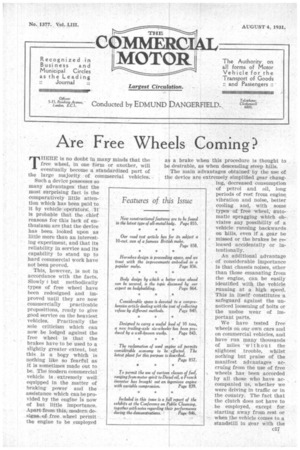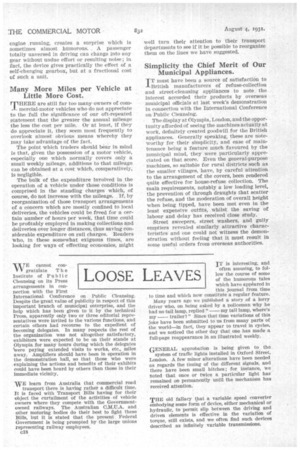Are Free Wheels Coming?
Page 39

Page 40

If you've noticed an error in this article please click here to report it so we can fix it.
HERE is no doubt in many minds that the T•free wheel, in one form or another, will eventually become a standardized part of the large majority, of commercial vehicles.
Such a device possesses so many advantages that the most surprising fact is the comparatively little attention which has been paid to It by vehicle 'operators: ;It is probable that the _ chief reasons for this lack of enthusiasm are that the device has been looked upon as little more than an interesting experiment, and that its reliability in service and its capability to stand up to hard commercial work have not been proved.
This, however, is not in accordance with the facts. Slowly $ but methodically types of free wheel have been redesigned and improved until they are now commercially practicable propositions, ready to give good service on the heaviest vehicles. Practically the sole criticism which can now be lodged against the free wheel is that the brakes have to be used to a slightly greater extent, but this is a bogy which is nothing like so fearful as It is sometimes made out to be. The Modern commercial. vehicle is extremely well equipped in the matter of braking power and the assistance which can be provided by the engine Is now of but little importance. Apart-from this,, modern de. signs,of free, .wheel permit the engine to be employed as a brake when this procedure is thought to bq desirable, as when descending steep hills. The main advantages obtained by the use of the device are extremely simplified gear chang ing, decreased consumption of petrol and oil, long periods of rest from engine. vibration and noise, better cooling and, with some types of free wheel, automatic spragging which obviates any possibility of a vehicle running backwards on hills, even if a gear be missed or the brakes be released accidentally or intentionally.
An additional advantage of considerable importance is that chassis noises, other than those emanating from the engine, can be easily identified with the vehicle .running at a high speed. This in itself constitutes a safeguard against the unnoticed loosening of bolts or the undue wear of important parts.
We have tested free wheels on our own cars and on commercial vehicles, and have run many thousands of miles without the slightest trouble, whilst nothing but praise of the manifest advantages accruing from the use of free wheels has been accorded by all those who have accompanied us, whether we were driving in traffic or in the country. The fact that the clutch does not have to be employed, except for starting away from rest or when the vehicle comes to_ a standstill in gear With the engine .running, creates a surprise which is sometimes almost humorous. A passenger totally unversed in driving can change into any gear without undue effort or resulting noise ; in fact, the device gives practically the .effect of a self-changing gearbox, but at a fractional cost of such a unit.
Many More Miles per Vehicle at Little More Cost.
91 HERE are still far too many owners of coml. mercial-motor vehicles who do not appreciate to the full the significance of our oft-repeated statement that the greater the annual mileage the less the cost per mile. Or at least, if they do appreciate it, they seem most frequently to overlook almost obvious means whereby they may take advantage of the fact.
The point which traders should bear in mind is that, given the possession of a motor vehicle, especially one which normally covers only a small weekly mileage, additions to that mileage can be obtained at a cost which, comparatively, is negligible.
The bulk of the expenditure involved in the operation of a vehicle under those conditions is comprised in the standing charges which, of course, do not increase with the mileage. If, by reorganization of those transport arrangements of a concern which are mostly confined to local deliveries, the vehicles could be freed for a certain number of hours per week, that time could be profitably employed in making collections and deliveries over longer distances, thus saving considerable expenditure on rail charges. Readers Who, in these somewhat exiguous times, are looking for ways of effecting economies, might well turn their attention to their transport departments to see if it be possible to reorganize them on the lines we have suggested.
Simplicity the Chief Merit of Our Municipal Appliances.
TT must have been a source of satisfaction to -1-British manufacturers of refuse-collection and street-cleansing appliances to note_ the Interest accorded their products by overseas municipal officials at last week's demonstration in connection with the International Conference on Public Cleansing.
The display at Olympia, London, and the opportunity afforded of seeing the machines actually at work, definitely created goodwill for the British appliances. Generally speaking, these are noteworthy for their simplicity, and ease of maintenance being a feature much favoured by the municipal mind, they were particularly appreciated on that score. Even the general-purpose machines, so suitable for rural districts such as the smaller villages, have, by careful attention to the arrangement of the covers, been rendered quite effective for house-refuse collection. The main requirements, notably a low loading level, the prevention of through draughts that scatter the refuse, and the moderation of overall height when being tipped, have been met even in the least expensive outfits, whilst the saving of labour and delay has received close study.
Street sweepers, street washers, and gully emptiers revealed similarly attractive characteristics and one could not witness the demonstration without feeling that it must result in some useful orders from overseas authorities.












































































































